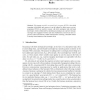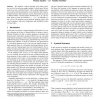260 search results - page 23 / 52 » Nonmonotonic Reasoning in FLORA-2 |
NGC
2010
Springer
13 years 4 months ago
2010
Springer
A key to overcoming the limitations of classical artificial intelligence and to deal well with enormous amounts of information might be brain-like computing in which distributed re...
LPNMR
1997
Springer
14 years 2 months ago
1997
Springer
This paper introduces power default reasoning (PDR), a framework for nonmonotonic reasoning based on the domain-theoretic idea of modeling default rules with partial-information i...
ASP
2005
Springer
14 years 3 months ago
2005
Springer
We present extended conceptual logic programs (ECLPs), for which reasoning is decidable and, moreover, can be reduced to finite answer set programming. ECLPs are useful to reason ...
EUROCAST
2007
Springer
14 years 1 months ago
2007
Springer
In this paper we introduce an extension of Equilibrium Logic (a logical characterisation of the Answer Set Semantics for logic programs) consisting in the inclusion of modal tempor...
ECAI
2006
Springer
14 years 1 months ago
2006
Springer
Abstract. We introduce a logical language with nullary operators min(n), for each non-negative integer n, which mean `the reasoner has at least n different beliefs'. The resul...


